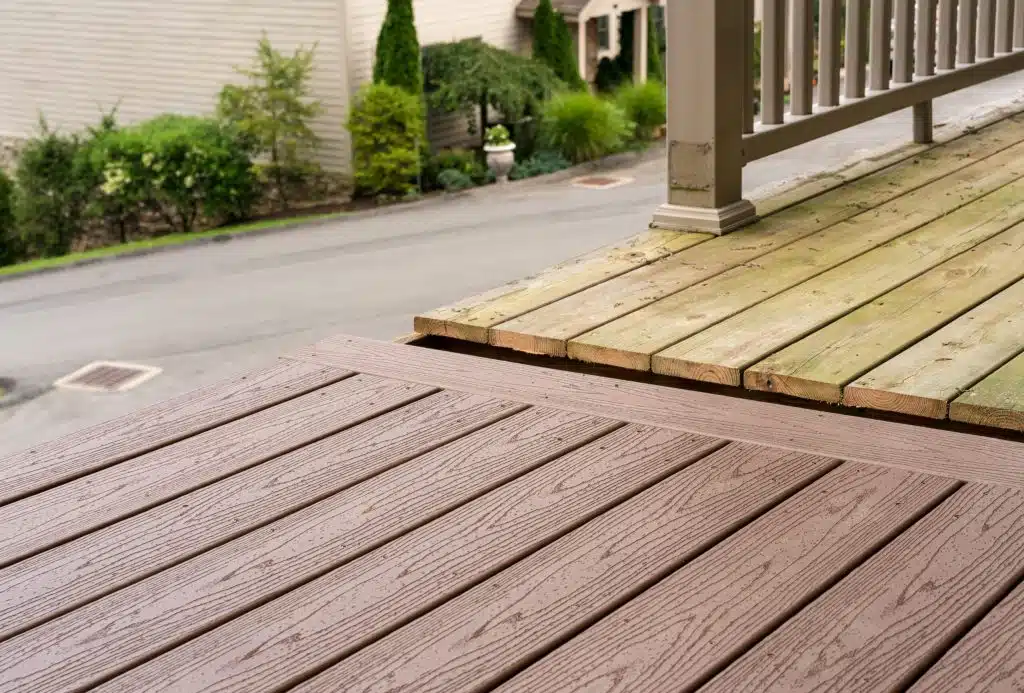Wood Deck vs. Composite Deck: What’s the Best Choice for Your Home?
Introduction: The Battle of Decking Materials
Choosing between a traditional wood deck and a composite deck can be a tough decision for homeowners. Each material offers unique advantages, and understanding the differences in cost, maintenance, and durability can help you make the right choice. In this blog, we’ll compare wood decking with wood-plastic composite boards and discuss which might be the best fit for your home.
Wood Decking vs. Composite Decking
A wood deck brings the classic beauty of natural timber, while wood-plastic composite decking is a modern alternative that offers durability and low maintenance. The choice comes down to factors like aesthetics, long-term upkeep, and how the deck will be used.
Wood Decking:
- Appearance: Natural beauty and warmth that can’t be replicated by composites.
- Cost: Typically more affordable upfront, especially for pressure-treated wood.
- Maintenance: Requires regular upkeep, including staining, sealing, and cleaning.
- Lifespan: Can last 10-20 years with proper care.
Composite Decking:
- Appearance: Designed to mimic wood but with a more uniform look.
- Cost: Higher initial investment but lower maintenance costs over time.
- Maintenance: Virtually maintenance-free, with no need for staining or sealing.
- Lifespan: Can last 25-30 years with minimal upkeep.

Wood Resistance and Durability
Wood decking has natural beauty but is vulnerable to weathering, which requires maintenance to maintain its look and integrity. On the other hand, wood-plastic composite boards offer better resistance to moisture, rot, and insects. This makes composite decking ideal for areas with extreme weather conditions.
- Weather Resistance: Composite decking is highly resistant to moisture and doesn’t warp or crack as easily as wood.
- Wood Resistance: Natural woods like cedar and redwood have inherent resistance to rot and insects, but still require regular maintenance to maintain these properties.
Cost Comparison: Wood Deck vs. Composite Deck
While wood decks tend to have a lower upfront cost, they require ongoing maintenance which can add up over time. Composite decks, though more expensive initially, require little to no maintenance, making them more cost-effective in the long run.
- Wood Decking: $15 – $35 per square foot, plus maintenance costs.
- Composite Decking: $30 – $45 per square foot, but with minimal upkeep.
Choosing the Right Material for Extreme Conditions
For those living in areas with extreme weather conditions, the choice between wood and composite can come down to durability. Wood-plastic composite decking is highly resistant to moisture, making it a better choice for wet climates or areas with heavy snowfall. Wood decks can be treated and sealed to improve their weather resistance, but still require more upkeep.
Conclusion
Both wood and composite decks offer distinct advantages, and the choice between the two depends on your priorities. For homeowners who love the natural beauty of wood and don’t mind regular maintenance, a wood deck may be the way to go. For those seeking low-maintenance and long-term durability, composite decking is an excellent option. By understanding the differences in wood resistance, cost, and wood deck vs. composite deck performance, you can select the best material for your outdoor space.

